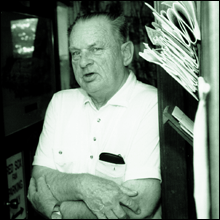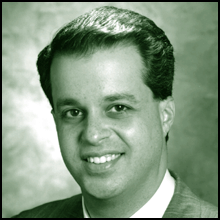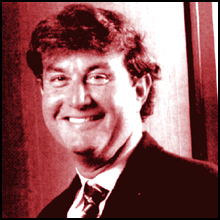![[Sidebar]](/standard/image/sidebar.gif)
![[Features]](/standard/image/headers/features_header.gif)
Heroes and villains '97
The year of greed -- the people who fought it
and those who personified itby Rudy Cheeks, Steven Stycos and Jody Ericson
Heroes
Donald Wyatt
DONALD WYATT, for being a pain in the Rhode Island Lottery Commission's butt. While the state basks in the profits from slot machines, scratch tickets, Keno, and other games ($100 million last year alone), Wyatt is essentially the lone voice of restraint on the commission. In meeting after meeting, the former US marshal has urged his fellow commissioners to consider the sobering fallout from the state's good fortune -- according to one estimate, there are close to 100,000 problem gamblers in Rhode Island, many of them poor and unemployed.Today, Wyatt is asking the commission and state officials to step up to the moral plate and not only devote more of Rhode Island's lottery profits to prevention, education, and treatment programs but to block the further expansion of casino-style gambling at places like Newport Jai Alai.
"The commission is addicted to raising more and more money through gambling, no matter what the cost. It's irresponsible," Wyatt told the Phoenix last August.
There is hope, however. Three months ago, the commission voted to contract with a national hotline that will refer callers to treatment sources and collect statistics on problem gamblers in the state -- a small step in the right direction, in great part to Wyatt.
HENRY SHELTON, for fighting for Rhode Islanders in need year after year. For more than three decades, Shelton has challenged big business, government, the media, and anyone else in a position of power and privilege to consider the issue of human suffering and how we, as human beings, should respond.
As coordinator of the George A. Wiley Center and a founding member of the Coalition for Consumer Justice, the Fund for Community Progress, and just about every other local initiative that addresses economic injustices, Shelton has always been there. Needless to say, he has been busier than ever lately.
With the end of "welfare as we know it," the issue has suddenly disappeared from the media radar screen and from the agenda of many politicians, particularly those who pushed for "welfare-to-work" initiatives. Indeed, now that the easy part (cutting people's benefits) is over, most of us would rather not look at the hard part. Shelton, however, has stayed on the case, consistently acquainting us with the reality of these cuts and demanding that those eliminated from AFDC and other assistance programs not just be shoved aside.
He has publicized national statistics indicating how poorly Rhode Island has served children in poverty, and Shelton has pushed and shamed those school districts that, inexplicably, have not applied for federal funding for breakfast and lunch programs. It is our shame that Shelton is working harder than ever now on behalf of Rhode Island's underprivileged.
KATE COYNE-McCOY, for battling so hard against Columbia/HCA's bid to take over Roger Williams Medical Center in her fight to protect those who would have been hurt the most by it -- the uninsured. As the health-care industry becomes more cost-conscious and competitive in response to pressure from managed-care institutions, McCoy, executive director of the Rhode Island chapter of the National Association of Social Workers, insists it's more important than ever to keep for-profit hospitals out of Rhode Island.
So when the Nashville-based Columbia/HCA, which controls about half the for-profit hospital beds in the nation, announced plans to buy Roger Williams last year, McCoy sprung into action, compiling statistics on the corporate giant that pointed to a dangerous pattern -- the elimination of certain money-losing procedures and dramatic cutbacks to charity care at the institutions Columbia/HCA had taken over.
In the end, McCoy and her allies, including Congressman Patrick Kennedy (D-Rhode Island), won. Rocked by a series of Medicare scandals across the nation, Columbia/HCA eventually backed away from its plans. And today, Roger Williams remains free of any corporate shackles.
Michael Pisaturo
MICHAEL PISATURO, for being so "out" and outraged during his first year in office. Pisaturo was the first legislator in Rhode Island to run as an openly gay man. As such, the state representative (D-Cranston) has been a tireless advocate for gay and lesbian causes.Unlike William Fitzpatrick, who came out after he won a seat in the Senate in 1992, Pisaturo says he is not merely a legislator "who happens to be gay" but a "gay activist who happens to be a legislator." He makes no bones about the fact that he is there to give his community a voice.
In this role, Pisaturo introduced a bill last year allowing for same-sex marriages (and became one of only four legislators in the nation to do so) after some of his colleagues in the House introduced a bill barring such a union. After heavy lobbying from Pisaturo, the latter piece of legislation died, and the Cranston rep decided to wait a year before pushing his any further. Pisaturo also has been an outspoken opponent of Rhode Island's anti-sodomy law, which he says blatantly discriminates against gay men.
RAYMOND PETTINE, for dedicating his life to guaranteeing that America's least powerful residents enjoyed the benefits of the US Constitution. No judge is ever likely to change Rhode Island more than Raymond Pettine did. Retiring this year at the age of 83, Pettine had a reputation for defending the rights of prisoners, women, minorities, and the poor.
In his first controversial case in 1969, Pettine declared that the federal government had violated the US Constitution when it had fired and then drafted a Peace Corps volunteer in retaliation for his criticism of US policy in Vietnam. In later years, he found that conditions at the Adult Correctional Institutions (ACI) in Cranston constituted "cruel and unusual punishment," and Pettine also upheld a student's right to sit silently during the Pledge of Allegiance.
Stung by discrimination as an Italian-American child attending Cranston's Shaw Avenue School, Pettine tolerated no such prejudices in his courtroom. In 1976, he ruled against the Rhode Island Bicentennial Foundation for arbitrarily refusing to endorse a gay-rights parade. In his written opinion, Pettine belittled the Foundation's excuse that parade organizers might advocate illegal conduct, asking, "Does the Bicentennial Commission need reminding that, from the perspective of British loyalists, the Bicentennial celebrates one of history's greatest illegal events?"
"People say I'm a liberal," Pettine told the Phoenix, "and that's OK with me."
Villains
Stephen Hamblett
STEPHEN HAMBLETT, for damaging the integrity of the Providence Journal-Bulletin by so shamelessly killing a news story because it might reflect badly on him and other Journal Co. executives.In November 1996, several newspapers reported that 12 Journal executives, including publisher Hamblett, had received 631,121 shares of Journal stock the day before the company's sale to the A.H. Belo Corporation was announced. WHJJ talk show hosts Tom DiLuglio and Mike Vallante picked up on the story, and veteran Journal reporter Brian Jones was assigned to research it.
Jones eventually concluded that the stock transfers were not illegal insider trading but a legal maneuver designed to reduce the Journal executives' income taxes. The executives had been scheduled to receive the shares as part of their pay plan, and by receiving them before the announcement, they were able to tell the Internal Revenue Service that their value was $20 a share. After the announcement increased the stock price to $29, Jones concluded, they would have had to pay more in taxes.
Executive editor Joel Rawson wanted to print Jones's story, but Hamblett interfered where he didn't belong and killed it. None of the executives had done anything wrong, Hamblett said, and they might be harmed by being named in the article.
Overall, 1997 was a good year for Hamblett. By engineering the end of the Journal-Bulletin's independence, he grossed more than $20 million.
BOB KRAFT, for so blatantly using Rhode Island as part of his scheme to extort a better stadium deal from Massachusetts. Breezing into Providence and talking up the idea of relocating 1996's American football division champs to Providence, the owner of the New England Patriots sure caused a stir.
Local TV news stations and the Providence Journal just couldn't get enough of Kraft, as speculation about "the stadium deal," gripped the headlines for weeks. In the meantime, local politicians, such as Governor Lincoln Almond and Providence Mayor Vincent "Buddy" Cianci, frantically attempted to outmaneuver one another, sucking up to Kraft and basking in the aura of big-time professional football in the Biggest Little.
Not surprisingly, a debate ensued as to whether people even wanted a football stadium in Providence and, if so, how much (in tax subsidies, highway and road reconstruction, etc.) they'd be willing to shell out to make it happen.
A lot of ugly little rifts surfaced as well: between the folks on Smith Hill (where the new stadium would have been located) and the city; between those who favored subsidies and those who didn't; and, most famously, between Almond, who neglected to invite Cianci to a number of the negotiating sessions, and the mayor himself, who seemed to be suffering from spotlight-withdrawal syndrome.
Yes, indeed, Kraft did a masterful job playing on the vanities of everyone concerned. And although you certainly won't get Kraft (or anyone in Rhode Island who was suckered) to acknowledge that the whole exercise was for no one's benefit but his own, it's obviously true. To paraphrase Lee Harvey Oswald, "We were patsies."
TOYS 'R' US, for crippling the competition and making consumers pay more for toys. Last September, Federal Trade Commission (FTC) Administrative Law Judge James Timony ruled that the giant toy retailer is violating federal antitrust law by conspiring with Hasbro, Mattel, and other toy makers to restrict sales to warehouse clubs such as BJ's Wholesale Club and Sam's Club.
Worried that the warehouse clubs are destroying its reputation for low prices, Toys 'R' Us has been pressuring toy makers not to sell popular toys to the clubs since 1991. And, faced with this demand from their biggest customer, Hasbro president Alan Hassenfeld, executive vice president Alfred Verrecchia, and other corporate executives reluctantly have complied.
The campaign, Timony concluded, has successfully eliminated the warehouse clubs as Toys 'R' Us competitors, driving up overall toy prices. As a result, Rhode Island Attorney General Jeff Pine and 38 other state attorneys general are suing Toys `R' Us, Hasbro, Mattel, Tyco, and Little Tykes for triple damages.
Alan Hassenfeld
ALAN HASSENFELD, for being so incredibly thoughtless as to announce a 20 percent reduction in Hasbro's workforce a mere two and a half weeks before Christmas. His motive? To boost the Pawtucket-based toy company's stock prices.Prior to this, the CEO of Hasbro, Inc., the 423rd largest public corporation in the US, had been a very good corporate citizen. As chairman of the RIght Now! coalition formed in 1991, Hassenfeld had been a strong voice for government ethics reform. Today, his many philanthropic deeds are well-known, including his role as the prime financial mover and shaker behind Hasbro Children's Hospital.
Founded by Hassenfeld's grandfather and great uncle to sell pencil boxes and school supplies, Hasbro has been a great American corporate success story, particularly in Rhode Island. That's why when, in January 1996, the company faced a hostile takeover attempt by Mattel, the Rhode Island General Assembly quickly moved to stop it. Essentially, lawmakers deleted a provision in state law that would have allowed Hasbro's a minority of Hasbro's shareholders to easily call a special meeting -- and thus try to convince the others to support the takeover.
All this legal maneuvering -- and Governor Lincoln Almond's signature -- occurred within a record two days, without the usual committee hearings or debate. And in return, Hasbro agreed not to cut jobs in Rhode Island, according to Senate majority leader Paul Kelly.
Naturally, then, Kelly and a number of other solons were upset that when Hasbro announced its 20 percent reduction last month, the company acknowledged that some of the jobs lost would be in Rhode Island. Whether a quid pro quo had been established in the passage of the emergency legislation is still unclear, but two things lead us to believe that the cutbacks have more to do with corporate greed than prudent management. The first is the extraordinarily bad timing of the announcement -- just before the holidays. The second is the primary reason for the layoffs -- a 16 percent increase in stock prices over the 10 days following the announcement.
VINCENT MESOLELLA JR., for being a walking conflict of interest and a poster boy for why legislators should not be allowed to sit on state boards and commissions. As longtime chairman of the Narragansett Bay Commission, a 1980 creation of the General Assembly that now has 260 employees and an operating budget of $30 million, state Representative Vinnie Mesolella (D-North Providence) wields a huge amount of clout and, for some strange reason, inevitably seems to see things from the perspective of those in the waste-hauling industry. (Maybe because he has accepted contributions from commission vendors and employees.)
This year, Mesolella rammed a $550,000 appropriation through the General Assembly for his Underground Storage Tank Financial Responsibility Review Board with virtually no scrutiny from legislative budget officials. When approached by reporters about this, Mesolella couldn't even provide them with the board's budget -- because he didn't have one down on paper yet. So successful has Mesolella been in receiving dubious funding that we have to wonder what kinds of incriminating photographs of legislative leaders he has stored away.
Most recently, Mesolella appointed former Central Falls mayor Thomas Lazieh as project manager for the Underground Storage Tank Financial Responsibility Review Board, part of whose job is to help gas stations pay for cleaning up leaks from underground tanks. Lazieh has no known background in environmental management or anything else having to do with service station cleanups, but he is a Democratic Party politician. For Mesolella, this obviously made him the most qualified of the 20 people who applied for the job.
Copyright © 1998 The Phoenix Media/Communications Group. All rights reserved.



